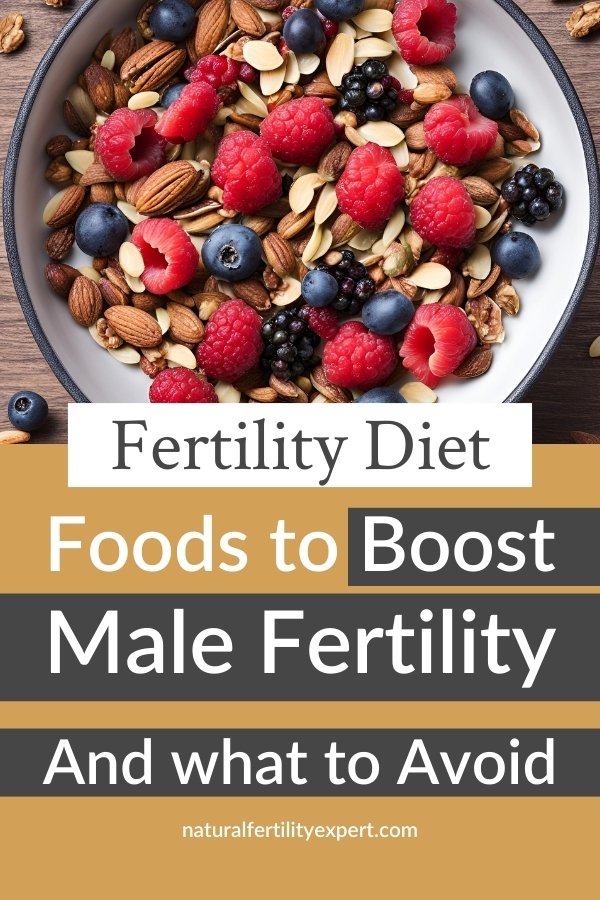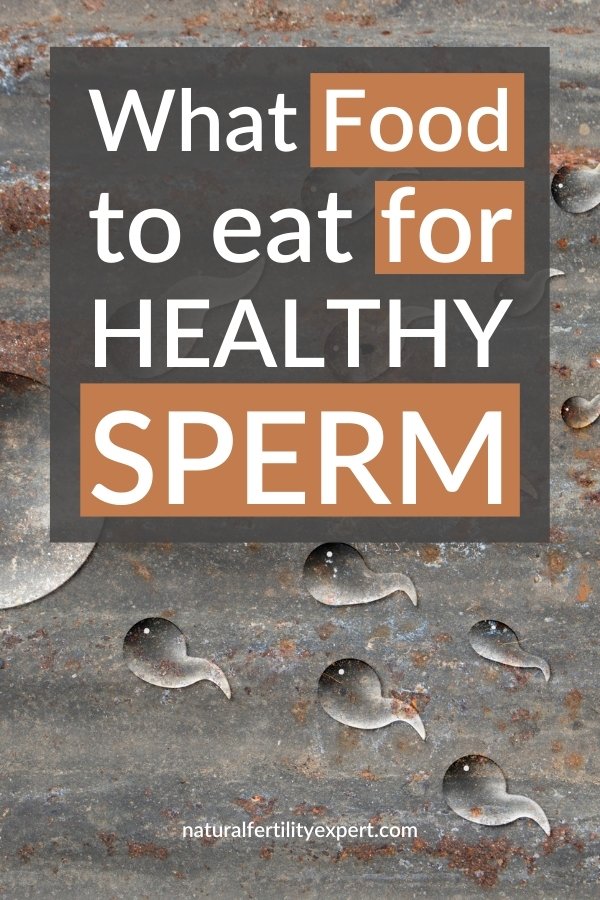BOOST SPERM HEALTH WITH DIET
Essential Foods and Actions For Male Fertility

While many factors influence sperm quality, diet plays a significant role in maintaining and improving sperm health.
This article explores how various general (not personalised) dietary choices can have a positive impact on most men’s sperm count, motility, morphology, and overall fertility health.
It’s important to note, however, that the best results are achieved when foods are tailored to each individual’s unique health balance, rather than following general guidelines alone.
Every human body has it’s own unique health balance, and what works for one may not work for another.
To help you uncover your unique health balance I’ve created a free guide: “8 Missed Clues Your Fertility Is Out Of Balance”.
This resource will provide you with valuable insights into your reproductive health and help you identify your unique health balance so that you can choose the right diet for your body. Grab your FREE copy here now.
The Importance of Diet in Sperm Health
A balanced and nutritious diet is essential for optimal sperm production and function. The foods we consume provide the building blocks for sperm cells and influence the environment in which they develop.
By making correct dietary choices, men can increase their sperm count, enhance sperm motility, and improve sperm morphology, and as mentioned above this is even more powerful when foods are chosen for your unique health balance.
General Nutrients That Boost Sperm Health
There are a few nutrient groups that are helpful for sperm health, as follows:
1. Antioxidant Rich Foods
Oxidative stress can damage sperm cells, leading to decreased fertility. Consuming foods high in antioxidants can help protect sperm from this damage and improve overall sperm health. But, it’s also important to reduce foods that lead to internal oxidation too, such as vegetable and seed oils (canola, sunflower, vegetable, and other oils that are high in omega 6).
a. Fruits and Vegetables
Colorful fruits and vegetables are excellent sources of antioxidants.
Some particularly beneficial options include:
- Berries: Rich in vitamin C and other antioxidants, berries help combat oxidative stress.
- Citrus Fruits: Oranges, grapefruits, and lemons are high in vitamin C, which is vital for sperm health.
- Leafy Greens: Spinach and kale are packed with nutrients that support overall health.
- Tomatoes: High in lycopene, tomatoes may improve sperm motility.
- Bell Peppers: These are rich in vitamins A and C, which are beneficial for sperm quality.
- Carrots: High in betacarotene, carrots can help protect against oxidative damage.
- Tea: All green, black, white, Pu-er, and oolong tea are all from the Camellia Sinensis tea plant and all are high in anti-oxidants. When consumed in the traditional Chinese way the caffeine (actually called Theine in tea) is not an issue for fertility.
These foods and teas are rich in vitamins C and E, betacarotene, and other antioxidants that can help increase sperm count and improve motility.
b. Nuts and Seeds
Walnuts, almonds, and pumpkin seeds are excellent sources of antioxidants and healthy fats. Regular consumption of these foods, if there is no pattern of ‘Dampness’ (see whether you have ‘Dampness’ with a free copy of my guide above), has been associated with improved sperm morphology and motility.
c. Omega 3 Fatty Acids
Omega 3 fatty acids play a crucial role in sperm membrane fluidity, which is essential for proper sperm function. Foods rich in omega 3s include:
- Fatty Fish: Salmon, mackerel, and sardines are excellent sources of omega3s.
- Grass-fed organic animal fats: These are a hugely underestimated healthy source of omega 3.
- Chia Seeds: Another plantbased source rich in omega3s.
- Walnuts: In addition to being high in antioxidants, walnuts are also rich in omega3s.
Incorporating these foods into the diet may help increase sperm count and improve overall sperm health.
d. Zinc Rich Foods
Zinc is an essential mineral for sperm production and testosterone synthesis. Foods high in zinc include:
- Oysters: Known for their high zinc content, oysters are excellent for male fertility.
- Beef: Lean cuts of beef provide significant amounts of zinc.
- Pumpkin Seeds: These are a great plantbased source of zinc.
- Lentils and Chickpeas: While not animal based, these legumes contain zinc and can be included in a diet that is balanced with other food groups too. Overconsumption of these foods is not advisable, as they can create issues with blood sugar and also the creation of ‘Dampness’ within the body. This can lead to problems with sperm morphology and motility.
Note about Absorbing zinc: Consuming organic tea (see antioxidant section above) with zinc rich foods will help your body to utilise the zinc more efficiently. Tea contains quercetin, which enables cells to absorb zinc more readily.
Adequate zinc intake can help improve sperm count and motility.
e. Folate
Being a B-vitamin (B9), with anitoxidant qualities, it is crucial for DNA synthesis and sperm production. Good sources of folate include:
- Leafy Greens: Spinach and kale are excellent sources of folate.
- Legumes: Lentils, beans, and peas are rich in folate.
- Avocados: These are not only nutritious but also provide healthy fats.
- Asparagus: High in folate, asparagus can support sperm health.
- Other: Beetroot is high in folate and also supports blood nourishment.
Consuming folate rich foods may help improve sperm count and reduce the risk of sperm abnormalities.
2. Animal Based Foods
Animal based foods can provide essential nutrients for sperm health when consumed as part of a balanced diet.
a. Meat and Fish
Grass-fed organic meats, such as chicken, beef, lamb, turkey, pork, venison and other wild meats, as well as wild caught oily fish are excellent sources of protein, zinc, B12, and selenium, all of which are important for sperm production and health. Meats and fish also contain coenzyme Q10, which has been associated with improved sperm motility.
b. Eggs
Eggs are a nutrient dense food that can benefit sperm health. They are rich in vitamin E, selenium, and zinc, all of which support sperm production and protect against oxidative stress. The choline found in eggs is also crucial for sperm cell membrane function, contributing to overall sperm viability. Eggs should be eaten whole (yolk and white together) and not separated.
Be cautious with eggs if you have high levels of Dampness. Not sure? Grab a free copy of my guide the “8 Missed Clues Your Fertility Is Out Of Balance” here to see whether ‘Dampness’ is a problem for your fertility health.
c. Dairy Products
If you have no pattern of Dampness within your body, then some dairy products might be benefial for you, particularly those that are full fat. They are rich in saturated fats, which play a role in testosterone production and the creation of Vitamin D.
If Dampness is an issue, avoid all dairy products until the Dampness is resolved.

Foods to Limit or Avoid
While certain foods can improve sperm health, others may have detrimental effects. To optimise male fertility, consider limiting or avoiding the following:
a. Processed Foods
High consumption of processed foods has been associated with lower sperm count and reduced sperm motility. These foods are often high in unhealthy fats, various additives, different types of simple carbohydrates, sugar, chemicals, and preservatives, which may negatively impact sperm health. Processed foods can also lead to weight gain and obesity, further affecting fertility.
b. Trans Fats
Trans fats, found in some fried foods and baked goods, have been linked to decreased sperm count and lower testosterone levels. Opt for healthier fat sources like olive oil, avocados, and animal fats instead. Reducing trans fat intake can improve overall health and potentially enhance fertility.
c. Alcohol
While the effects of moderate alcohol consumption on a fertility journey are still disputed, excessive drinking is known to lead to decreased testosterone production and reduced sperm quality. Limiting alcohol intake is advisable for those looking to improve their fertility. Studies have shown that heavy drinking can impair sperm production and lead to hormonal imbalance in men and women.
d. High Sugar Foods
Diets high in refined sugars and carbohydrates may lead to insulin resistance, which can negatively affect sperm production and quality. Opt for complex carbohydrates and limit intake of sugary foods and beverages. Keep carbohydrate consumption to a max of 30% of your daily food intake. High sugar intake can contribute to obesity and metabolic syndrome, both of which are linked to decreased fertility.
Hydration and Sperm Health
Proper hydration is often overlooked but plays a crucial role in maintaining optimal sperm health. Adequate fluid intake helps in the production of seminal fluid and supports overall reproductive function.
Hydration is essential for maintaining the viscosity of semen, which can impact sperm motility. Dehydration can lead to thickened seminal fluid, making it more difficult for sperm to travel effectively. All cells need water to remain healthy, and insufficient water leads to a variety of functional issues for cells.
Regular fluid intake is essential to keep all cells healthy.
Aim for 6-8 glasses of water per day and include hydrating and natural juicy foods in your diet.
The Role of Body Weight in Sperm Health
Maintaining a healthy body weight is essential for optimal sperm production and function. Both obesity and being underweight can negatively impact male fertility.
Effects of Obesity on Sperm Health:
- Decreased Sperm Count, Motility and Morphology: Obesity is associated with lower sperm concentration and reduced motility, as well as low healthy morphology.
- Altered Hormone Levels: Excess body fat can lead to hormonal imbalance, including reduced testosterone, FSH, and LH levels, which are crucial for sperm production.
- Increased Risk of DNA Damage: Obesity is linked to increased oxidative stress, which can lead to DNA damage in sperm cells causing DNA Fragmentation.
Effects of Being Underweight on Sperm Health:
- Reduced Sperm Count: Being underweight can lead to hormonal imbalance that negatively affects sperm production.
- Potential Hormonal Imbalance: Low body fat can disrupt the balance of reproductive hormones, further impacting fertility.
Achieving and maintaining a healthy body weight through a balanced diet and regular physical activity can significantly improve sperm health and overall fertility.
The Impact of Cooking Methods on Sperm Health
The way food is prepared can affect its nutritional content and, consequently, its impact on sperm health. Here are some cooking methods that can help preserve nutrients:
a. Steaming
Steaming vegetables helps retain their nutrients, particularly watersoluble vitamins like vitamin C, which is important for sperm health. This method also avoids the addition of unhealthy fats that can occur with frying.
b. Grilling and Broiling
These methods can be healthy ways to prepare meats and fish. However, avoid charring foods, as this can produce harmful compounds that may negatively impact health.
c. StirFrying
Quick stirfrying in a small amount of healthy fat can preserve nutrients while adding flavor to vegetables, fish, and meat. Using oils high in monounsaturated fats, such as olive oil, can enhance the health benefits of this cooking method as well as using animal fats from grass-fed organically raised animals.
d. Baking and Roasting
These methods are excellent for preparing fish, meat, and vegetables while retaining their nutritional value. Baking at moderate temperatures can help maintain the integrity of the nutrients in the food.
The Role of Timing in Dietary Changes
Improving sperm health through diet is not an overnight process. Sperm take approximately 72-90 days to mature, so dietary changes may take at least two to three months to show noticeable effects on sperm quality.
Other Important Factors for Sperm health
a. Consistency is Key
It’s important to maintain a healthy diet over time rather than making drastic short term changes. Gradual, sustainable changes are more likely to lead to lasting improvements in sperm health.
b. The Importance of Overall Lifestyle
While diet plays a crucial role in sperm health, it’s important to consider other lifestyle factors that can impact male fertility such as:
c. Regular Exercise
Moderate exercise can help maintain a healthy weight and improve overall health, which can positively impact sperm quality. Regular physical activity has been shown to enhance testosterone levels and improve blood circulation, both of which are beneficial for sperm production.
However, excessive or intense exercise may have negative effects on sperm production due to consuming vitality (Qi in Chinese) too strongly, so balance is key.
To assess your level of Qi/vitality, so that you can choose the right level of activity for your unique health balance grab a free copy of my guide the “8 Missed Clues Your Fertility Is Out Of Balance” here.
d. Stress Management
Chronic stress can negatively affect sperm production and quality. Incorporating stress reduction techniques such as meditation, yoga, or regular relaxation can be beneficial. High stress levels can lead to hormonal imbalance that may impair fertility.
e. Adequate Sleep
Getting enough quality sleep is crucial for hormone regulation and overall health, which can impact sperm production and quality. Sleep deprivation can lead to increased stress hormones and decreased testosterone levels, both of which are detrimental to sperm health.
f. Avoiding Harmful Substances
Smoking, excessive alcohol consumption, and use of recreational drugs can all have negative impacts on sperm health. Avoiding these substances can help improve fertility. Smoking of cigarettes and cannabis has been linked to decreased sperm motility and increased DNA fragmentation in sperm cells.
Conclusion
Improving sperm health through diet is a natural and effective way to enhance male fertility.
By focusing on nutrient dense foods rich in antioxidants, omega 3 fatty acids, zinc, and folate, men can potentially increase their sperm count, improve sperm motility and morphology, and enhance overall sperm health.
When this is applied on the foundations of knowing your unique health patterns, diet becomes even more potent and helpful for your fertility health.
By making informed and unique dietary choices you can take proactive steps towards improving your sperm health and increasing your chances of conception.
Remember, the journey to improved fertility is a jog, not a sprint, and consistent, longterm healthy habits are key to success.
Boost Your Fertility Health efficiently:
When dealing with fertility issues, or simply wanting to optimise fertility, the key to finding the right way to do it is to first find the root balance of your health – i.e. find the things that aren’t working as well as they should be.
To help you with this I have created a FREE guide that will identify which of the 8 patterns of imbalance you are presenting with.
Once you know this you can tailor every thing you do (diet, lifestyle, etc) towards what your body uniquely needs – and stop wasting time and money on things that don’t work for the majority of people.
Click here to grab a FREE copy of my guide, “8 Missed Clues Your Fertility is Out of Balance”.
Need more help?

Free Guide
8 MISSED CLUES YOUR FERTILITY IS OUT OF BALANCE – even if you’re over 40
Discover What’s Stopping You Having Your Baby
8 MISSED CLUES YOUR FERTILITY IS OUT OF BALANCE – even if you’re over 40
If you’re 40 or over and pregnancy isn’t happening for you naturally, or with IVF, then this guide will help you discover why being 40+ isn’t a barrier to having a baby – as long as you identify the root cause of your fertility issues and then bring your body back into balance.